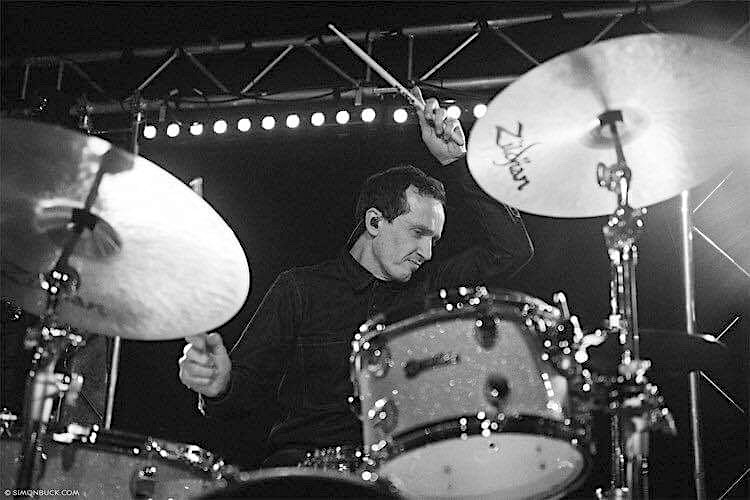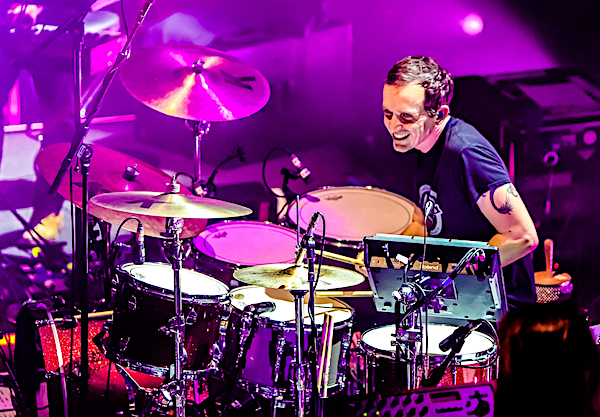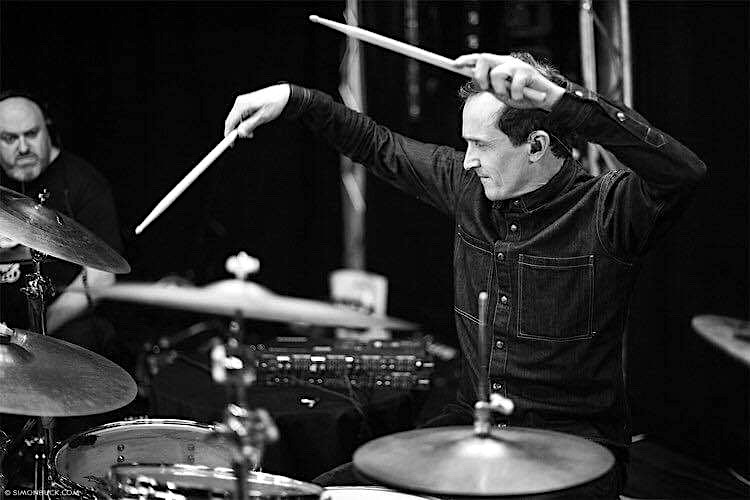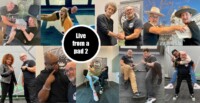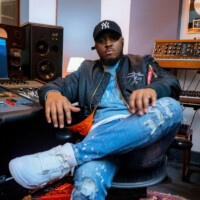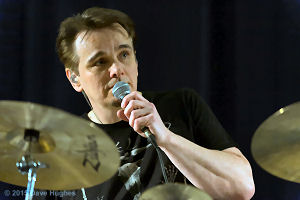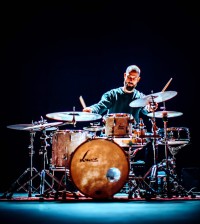With over 20 years as a successful session drummer Luke Bullen has certainly proven his place in the UK music scene.
Hailing from Norwich he soon found new challenges and creative input by moving to London and completely immersing himself in the music scene. New and exciting possibilities were waiting just around the corner.
He has provided grooves for artists such as Joe Strummer, Billy Bragg, John Squire, KT Tunstall, Heather Nova and many, many more.
Today, besides running his own studio back in Norwich, Bullen is touring the world with Bryan Ferry.
I caught up with Luke to chat about his studio, his way from Norwich to London and back, and his involvement in the short film ‘3 Drummers’.
You had your first drum lessons at school but soon started gravitating towards London.
Living up here I was passionate about drums and music but living in Norwich I just didn’t know how to turn that into a career. It’s only when I started travelling to London and having lessons there, I started to have an understanding of the possibilities and my passion continued to grow.
In Norwich I was influenced by Nathan Curran who was studying at DrumTech, so I decided to go there for lessons too. I was still living in Norwich at the time, so I would get on the train on a Saturday morning, go down to London for a lesson and then straight back home. I did that for about a year and loved it so much that I decided to do a full time course.
Moving to London is not a decision you make overnight though so I first got a job to save up some money. After about 2 years of ‘gearing up’ for it I then moved to London at the age of 20 to do the one year course at DrumTech. While I was there they got affiliated with Thames Valley University and started offering a 2-year diploma which I got onto. Unfortunately I never finished it though because in my second year on the course my band got signed to V2 Records and we went to America to make an album.
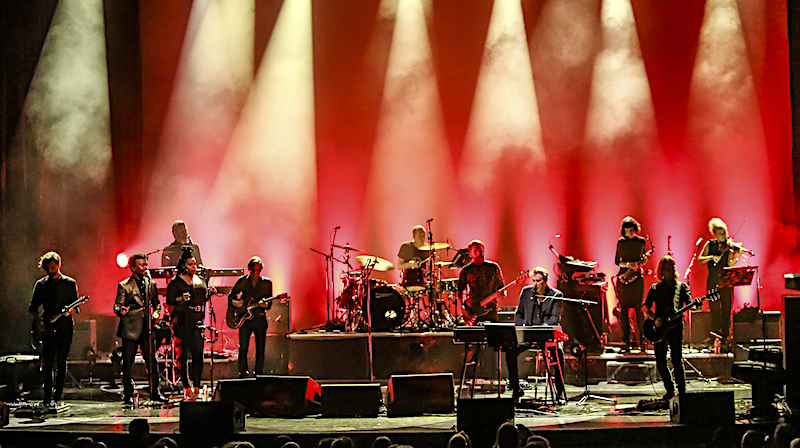 The band that got signed was ‘Addict’?
The band that got signed was ‘Addict’?
Yes. I got the call to join the band probably about six months after moving to London. We did the whole club circuit in London, got management and did some bits outside the country. Everything was building up and there was a bit of a bidding war between a couple of record companies too. It was a really exciting time. We ended up signing with Richard Branson and because of the British Rock presence in the States it was decided they would send us to L.A. for 3 months to record the album.
We made the record and started touring a lot around Europe and America. We also got a song in a movie, made videos, released singles but we just didn’t quite tip over. We signed at the same time as Stereophonics and they just hit it off; we never quite got the right song at the right time. At the end of that album cycle they sent us back to America to work on another album. That was 2-3 years later and by that time we had a lot of difference influences, so we ended up making a very different album. I think because of that, the record label couldn’t quite build on what we had achieved so far so they decided to drop us. We carried on under a different name for a while after that but it just never really took off.
One door closes, another one opens: That was the start of your session career, wasn’t it?
Yeah. Once we got dropped I somehow needed to make a living and got a job in a local Japanese restaurant. A friend of mine had a company with a couple of vehicles and it was at a time when producers were travelling around with their own ProTools rigs. A lot of them had flight cases with speakers and mic collections which they needed to move around for various sessions. My friend was also a drummer and started contacting a lot of producers to offer his driving service, and I started driving for him.
A lot of the time the producers would just jump in the van with me and on one of those occasions I met a producer called Ian Grimble. We got along really well and a little while later he called me up saying he needed a drummer for a session for a female artist. I went in to give it a go and during that session a guy called Scott stuck his head around the door and asked me to come and have a chat. Turns out he was one of the guys in The Mescaleros who needed a drummer. I didn’t hear anything for a while but then got a phone call saying: “We’re off on tour in two weeks. Are you still around?”. I went along to have a try-out, got the gig and off we went to the States again.
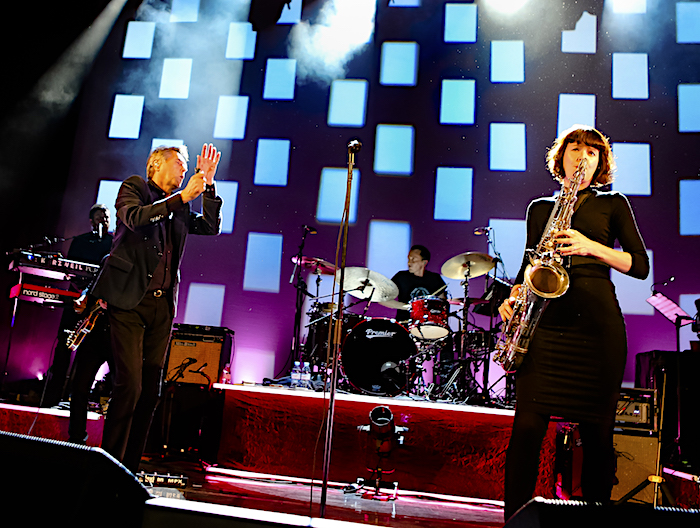 And that was just the start. You joined KT Tunstall after that?
And that was just the start. You joined KT Tunstall after that?
Yeah. Whilst I was touring with Joe Strummer (lead singer of The Clash and founder of The Mescaleros) I started getting more and more session with other artist. I met KT during that time. She was an undiscovered singer/songwriter doing the circuit around London when I started working with her. She would write all the songs and me and the bass player would just show up and help her out for free. It was all small singer/songwriter gigs: she’d have a slot to play 3/4 songs and we would rock up and use the house gear. We did that for a good 6-12 months. At that time I was still touring with Joe and got involved with John Squire of The Stone Roses too. Through that whole period KT was just ticking along in the background doing her thing. Whenever there was a gig we would just turn up and have fun.
At some point KT and I were actually touring in the band for another friend of ours when she got the call to go on Jools Holland. That’s when things really kicked off and I ended up touring with her from 2002-2012. It was a great time! What was really enjoyable was that it basically went from us rehearsing in her flat, to doing Jools Holland and playing really big gigs. It was really nice to be part of that whole journey. I’m really grateful for that because I think you only get that chance at one point in your life. I’m too old for that now. I’ll get called to play for people but I won’t get called to play with those young artists that you’re gonna suddenly see grow.
That sounds great. It also means you probably had quite a creative influence on the music rather than ‘just’ being a session guy?
Yeah, well, we started dating and ended up getting married, so we were definitely in it together. When we started dating before things took off, we were influencing each other with music we were listening to and she moved to London so I introduced her to all my musician friends.
I read a comment of yours where you describe working with a new artist and how them coming into rehearsals for the first time elevates the room and adds new magic to the music. Tell me more about that.
That’s been my experience of the ‘x-factor’; and I don’t mean that in terms of the show. It’s always fascinating to me why those people sustained their careers or why they’ve become successful in the first place. For me that’s the ‘x-factor’ and that’s been a common link between all of them. They’ve all been fantastic musicians but there are lots of great musicians out there. Why do people still go and see them? It’s something you can’t quantify; they’ve just got a thing.
I always think of people like Keith Richards or Seasick Steve more recently. I would imagine, from what I’ve seen and experienced, that they see a response to something they’re doing and then they exaggerate what they’re doing to get it back. Not even necessarily on a conscious level. Keith Richards is an amazing guitarist but he’s got something extra, and it’s the extra thing that I think gets exaggerated by the response of the audience and of people around him. One thing feeds the other: the audience feeds that, the artist exaggerates it and it becomes a bigger part of their artistry, and then the audience responds even more. It’s the same with Seasick Steve or Bryan Ferry. They have a persona that they tap into and it blossoms.
I remember that vividly with Bryan Ferry. We spent two weeks rehearsing before we went on tour and in the studio he was that guy who was always looking incredibly dapper wearing shirt and tie and over those two weeks he just became the guy in the shirt who was telling us what to do and how he wanted to hear things. That was fascinating already. On the first show of the tour when he walked onto the stage, I saw that whole new person. He almost ‘got into character’. I don’t mean that it’s calculated; it’s just what they do. We’re selling a fantasy.
That’s one of the things I really value about touring. Life is challenging and has it’s ups and downs and music does two things: it brings people together and in that communal experience they can let the day and their lives go and engage in a fantasy. I think those people who have the charisma and personality to create a bigger fantasy are the ones people buy into. There’s a theatre to it. With the really successful artists I worked with that has been fascinating to watch.
You have already mentioned Bryan Ferry – that’s your main gig at the moment?
Yes, this will be my fifth year with him. We’ve just done South Africa, Australia, New Zealand and Japan. It’s such a good gig.
Bryan had such great drummers that I’ve looked up to over the years. I remember being at DrumTech and Andy Newmark did a session there and it just blew me away. Yes there are better drummers out there technically but he sat there and he just had it. He had that thing, in a similar way that Bryan, Billy and Joe did. I had the pleasure and privilege to trying to recreate some of those parts. So not only is there great music to play with a brilliant bunch of people, but it’s a continuing education.
How did the gig come about?
Bryan quite regularly has a personnel change to freshen things up and they were looking for a new rhythm section. At the time my friend Paul Beard, who is a keyboard player, left the Robbie Williams gig and joined Bryan as a MD. He called me and asked if I wanted to audition.
You’ve recently been involved in a short movie called ‘3 Drummers’ alongside Steve Barney (Anastacia, Mike + The Mechanics) and Nathan Curran (Basement Jaxx). How did this idea come about?
Since moving back to Norfolk I started surfing and one of my best surfing friends is a guy called Martin Gough who is a producer, director and editor by trade. After a surfing session on a cold January morning we got talking about documentaries. I started talking about Steve and Nathan and the unlikelihood of us all being from Norfolk and growing up to have successful drumming careers. Martin was unaware of Steve and Nathan and thought the story was interesting. Initially we thought we’d do some interviews and put up some short episodes on YouTube. The idea was just to inspire young people and show them that if we could do it, they can too. It all got a big bigger than that.
We did a couple of days of filming in my studio and then my friend Simon Bayliss came in to do the editing. He’s the one who brought in all playing footage and the photos of us as kids, which really brought it to the next level.
So the idea came from me but it was everyone else getting involved that then turned it into what it became.
So all three of you grew up in the same area. Have you known them a long time then or did you only meet later on life?
I met Steve when I was about 13. He is a couple of years older than me so when I was playing in a covers band with some other teenagers, he was playing in cool bands. His drumming was up here, mine down there. I remember there being a festival in Norwich where he was playing and I was just standing behind the stage so I could watch him.
Nathan I met when he moved to my school. He was even more talented because he was younger than me but a much better drummer. I was wrecking my brain about how I could do that. At that time he was already going to DrumTech – which is what sparked the interest in me going there too.
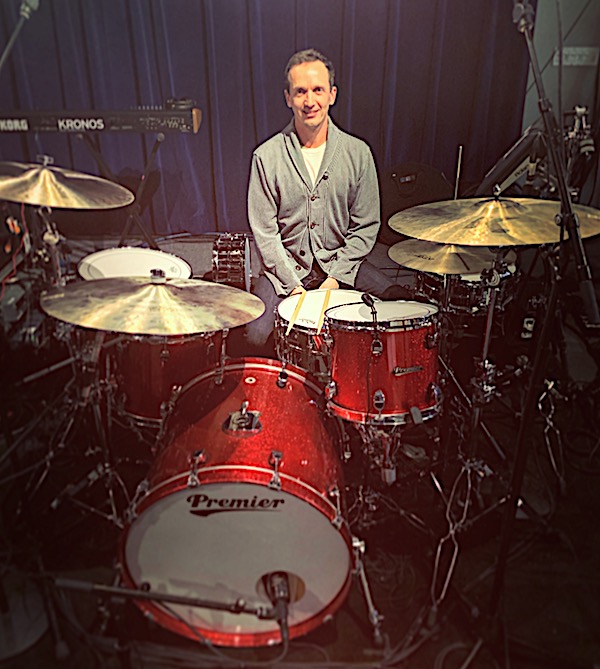 Three aspiring young drummers in the same area – has there ever been a bit of a rivalry?
Three aspiring young drummers in the same area – has there ever been a bit of a rivalry?
Yeah, but because they are both such nice guys, there was never any malicious nature to it. Every time something happened for one of us, the first emotion was “well done” – the second emotion was “I wanna do that”! [laughs]
Maybe if it was people I didn’t particularly like on a personal level that feeling would have been slightly different. But because we all got on so well the respond was just: Great. Well done.
Let’s talk about your studio. It’s in an old ambulance station in Norwich? Do you live there too?
Yes. I was at a point where I needed a change from London. It was a bit of a punt because I didn’t know if I was gonna get more involved in production but I was lucky enough to continue touring with Billy and now Bryan. I love the contrast between being on the road and being up here doing remote sessions. Here I can walk the dog in the morning, have some breakfast and then go into the next room and do some recording. I feel very privileged.
This is what’s great about modern technology. I know it had a negative impact on the industry but we can do this. I can be in touch with a friend in London, he sends me two tracks, I record drums on them, send them back and he can check them out before lunchtime. Embracing the modern world has it’s positives as well as it’s negatives.
As well as doing remote sessions you also have accommodation for whole bands to come in and record.
Yes. At the end of last year I changed the emphasis on it though. When I built it I wanted to get young bands in, support them, share my experiences and help create something – but with all my touring it’s really hard to commit to a project. I just can’t do that right now so I’ve put that idea on hold for now. I’m currently enjoying playing with Bryan but when that ends I have no idea what will happen next.
So yes, I’m currently focusing on the remote sessions. Rather than having just one, I have three kits set up and mic’d up in here and I’m engaging more with social media to get people aware of that. There is so much you can do on a laptop nowadays but one thing you can’t do as easily is recording live drums. I have a few vintage kits, a nice mic collection, a nice desk; so it’s all about celebrating the good fortune that I can do it.
When I’m away on tour I simply lock up the studio and rent the rest of house out to holiday makers.
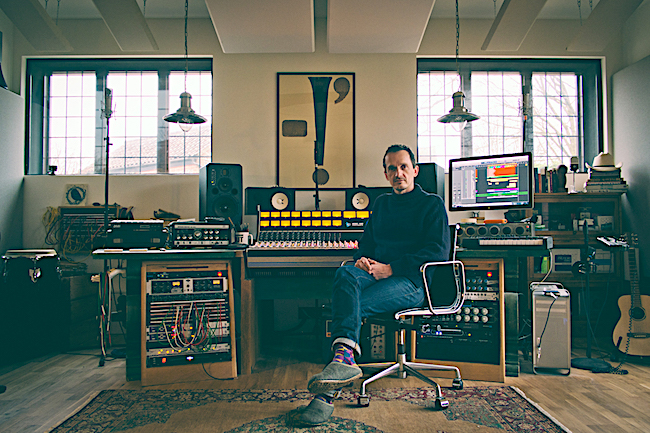 Has recording and producing always been a passion of yours then?
Has recording and producing always been a passion of yours then?
Drums first and foremost. When I was in and out of studios when I was living in London, I was always fascinated by the process. I love mic positioning, playing with sounds, working with phasing… all of that has been a real education. I love sitting behind the board, arranging songs (I think I have a good ear for that) and I sat in studios a lot watching top producers do just that. It’s part of what I can give but I’m not at a point yet where I would put drums to the side. They’re still top of the list.
Finally, what’s next?
Well, I’m just back from New York where I got to play with Roxy Music at their Rock’n’Roll Hall of Fame induction and in a couple of weeks I head into rehearsals with Bryan before heading off for a tour around Europe culminating in my first show at the Royal Albert Hall. We have a couple of European Festivals then we head to the US and Canada for a six week tour over the summer returning back to these shores sometime in September. Should be fun!
Thanks a lot for your time Luke!
Interview by Tobias Miorin
May 2019

